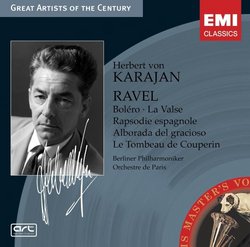| All Artists: Maurice Ravel, Herbert von Karajan, Paris Orchestra, Orchestre de l'Opéra de Paris, Berlin Philharmonic Orchestra Title: Ravel: Boléro; La Valse; Rapsodie espagnole; Alborada del gracioso; Le Tombeau de Couperin Members Wishing: 0 Total Copies: 0 Label: EMI Classics Original Release Date: 1/1/2005 Re-Release Date: 8/2/2005 Genre: Classical Styles: Historical Periods, Modern, 20th, & 21st Century, Symphonies Number of Discs: 1 SwapaCD Credits: 1 UPC: 724347686023 |
Search - Maurice Ravel, Herbert von Karajan, Paris Orchestra :: Ravel: Boléro; La Valse; Rapsodie espagnole; Alborada del gracioso; Le Tombeau de Couperin
 | Maurice Ravel, Herbert von Karajan, Paris Orchestra Ravel: Boléro; La Valse; Rapsodie espagnole; Alborada del gracioso; Le Tombeau de Couperin Genre: Classical
|
Larger Image |
CD Details |
CD ReviewsKarajan Conducts Ravel: Hot French/Spanish Music Rudy Avila | Lennox, Ca United States | 10/02/2005 (5 out of 5 stars) "This remastered recording features Karajan in his prime conducting Ravel music with both the Orchestra De Paris and Berlin Philharmonic. The sound is terrific and the rich melodic and seductive music of Ravel's take on Spanish music has never sounded hotter. The Bolero was made famous through its use in the film "10" with Dudley Moore, Bo Derek and Julie Andrews. It was music that Bo Derek's character intended to hear while making love. Maurice Ravel, a French composer of the turn of the century and early twentieth century, was highly influenced by the music of France's southern neighboor Spain. The music is very Spanish in nature and very sexually-charged. To the best of my knowledge, Zubin Mehta's rendition of the Bolero is the best, though Bernstein and Karajan really deliver it with sizzling hot intensity. La Valse, composed when Ravel's mother died, is sumptuous, slow and develops into a wild frenzy, all done with great orchestral virtuosity. The energy of the Rapsodie Espagnole has never soundes so vibrant and the Alobrada del Gracioso is charming. The melancholy and Baroque-style Tomb of Couperin is also a winner. EMI continues to be the foremost record label of classical music, along with Deutsche Grammophone. They have even surpassed RCA which seems to have faded away and continues to market only pieces that have been on the market for years. Any true fan of classical music, of Maurice Ravel and Herbert Von Karajan, will want to buy this recording. It is excellent." Haunting Ravel from Paris Santa Fe Listener | Santa Fe, NM USA | 02/13/2006 (5 out of 5 stars) "There are magical sounds on this CD that no one else, not even Boulez, has ever extracted from Ravel's socres. The Rapsodie espagnole in particular, taken almost at a stasis and often in a whisper, is transformed. No longer a glossy also-ran to Debussy's Iberia, the work is spellbinding, entirely due to Karajan's ability to get the Orchestre de Paris (which he briefly led, along with Berlin and Vienna--an achievement never duplicated) to play with transcendent refinement. La Valse is equally hypnotic--Karajan finds more than a touch of the ghostly painter Redon in these melancholy, eerie waltzers. EMI's sound is a bit distant but very detailed and natural. As a non-lover of Ravel, I must concede that this is great music when played at such a level. I also realize that Karajan, granted so much in talent, power, and wealth, doesn't need another accolade, but in fact he's a marvelous conductor of French music, even though it was far from a major focus of his career." Echt Karajan has its drawbacks L. Ackerman | Ashburn, VA (USA) | 07/30/2009 (3 out of 5 stars) "If you like your Ravel technically & mechanically perfect you cannot go wrong with Karajan. But if you like your Ravel truly sensual, nuanced and flexible, skip this. The competition achieves more of the sensual French psique plus the decadent neurosis of one of my favorites pieces 'La Valse' (1919). If I don't mention another conductor is because there are too many good ones to even remember.
Contrary to what is stated somewhere else, as if La Valse (1919) was a mere corolary to the composer's mother passing, I find it much more compelling to think that it represents the collapse of the Austrian empire (where Strauss waltzes were pervasive!) and the apparent breakdown of Europe after the Great War (WWI). The recording is spacious but clear and tonally broad. Some may find the acoustics too reverberant, I did not." |

 Track Listings (11) - Disc #1
Track Listings (11) - Disc #1